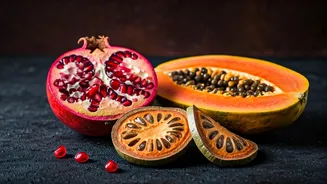Pomegranate's Power
Pomegranate, a fruit celebrated for its vibrant red seeds, is known for its rich antioxidant content. These antioxidants may play a role in preventing
cancer cell development. Regular consumption of pomegranate has been associated with various health benefits, including improved cardiovascular health and reduced inflammation. The fruit's unique compounds work synergistically to provide a shield against cellular damage. In studies, pomegranate extracts have shown promise in inhibiting the growth of cancer cells in different types of cancer. The fruit's versatile nature allows it to be enjoyed in various ways, from fresh juice to salads, making it a delightful addition to any diet while potentially contributing to cancer prevention. The antioxidant properties of pomegranate, primarily derived from polyphenols, are believed to neutralize free radicals, safeguarding the body's cells from oxidative stress and potentially reducing the risk of cancer.
Bael Fruit’s Benefits
Bael fruit, also known as wood apple, is a lesser-known gem in the realm of potential cancer prevention. This fruit is rich in various bioactive compounds, including tannins and flavonoids, which contribute to its potential anti-cancer effects. Bael fruit is traditionally used in Ayurvedic medicine for its digestive properties, and recent research suggests it could also play a role in preventing the development of cancerous cells. The fruit's unique composition includes antioxidants that can protect cells from damage. Incorporating bael fruit into your diet may contribute to overall well-being. The fruit's ability to help in cancer prevention arises from the presence of specific compounds that work to fight against the development of cancer cells. Consuming bael fruit regularly may support the body's natural defenses against various types of cancer. While more research is required to fully understand the effects, initial findings offer an encouraging look at the potential of bael fruit.
Papaya’s Potential
Papaya, a tropical fruit known for its vibrant color and sweet taste, is another contender in the potential cancer-fighting fruits. Papaya is rich in antioxidants, vitamins, and enzymes, all of which contribute to its potential health benefits. The antioxidants in papaya, such as lycopene and beta-carotene, help protect cells from damage caused by free radicals. This may reduce the risk of cancer development. Moreover, papaya contains enzymes like papain, which has shown promise in cancer research. Papaya can be incorporated into your diet in salads, smoothies, or enjoyed on its own. The fruit offers a refreshing taste and a wealth of nutrients. Its consumption can be a part of a well-rounded diet that aims to protect overall health. Consuming papaya regularly may have preventative effects, and additional research is ongoing to fully understand its anti-cancer properties and mechanisms.
Jamun’s Cancer Fight
Jamun, the dark purple fruit also known as Java plum, is a well-regarded fruit in the Indian subcontinent. Jamun is rich in antioxidants and other beneficial compounds that may help in preventing the growth of cancer cells. These properties are believed to contribute to the fruit's potential anti-cancer effects. Regular consumption of jamun has been associated with several health benefits. The fruit's unique composition supports the body's defenses against cellular damage. Integrating jamun into your diet may be a great choice for your well-being. Jamun's components contribute towards cancer prevention by fighting the development of cancerous cells. Studies have indicated that jamun can be effective against certain cancer types. While more research is required, the preliminary results are encouraging.
Amla's Antioxidants
Amla, also known as Indian gooseberry, is packed with antioxidants, making it a valuable addition to any health-conscious diet. The fruit's high antioxidant content plays a role in protecting cells from damage caused by free radicals. The potential anti-cancer effects of amla are largely attributed to these antioxidant properties. Regularly consuming amla has been associated with numerous health benefits, including enhanced immunity. The fruit's unique composition is believed to bolster the body's natural defenses against cellular damage and may reduce the risk of cancer development. Amla can be incorporated into your diet by consuming its juice or in supplements. Adding amla to your routine might be a wise decision. The antioxidants found in amla are believed to neutralize free radicals, thereby protecting cells from oxidative stress and potentially reducing the risk of cancer.
Guava's Guard
Guava, a tropical fruit known for its unique flavor, is a rich source of vitamins, antioxidants, and fiber. These elements contribute to the fruit's potential health benefits, including cancer prevention. Guava is rich in vitamin C and other antioxidants, which can protect cells from damage and contribute to cancer prevention. Consuming guava can support the body's defenses against cancer. Adding guava to your diet is a flavorful and nutritious choice. This can be integrated by eating the fruit itself or as a juice. The antioxidants found in guava play a vital role in defending cells from oxidative stress. Regular consumption of guava may offer protective benefits and contribute to overall well-being. More studies are required to fully understand the anti-cancer properties, but initial findings are encouraging.
Custard Apple's Defense
Sitaphal, also called custard apple, provides a creamy texture along with potential health benefits. The fruit contains various nutrients and antioxidants that may aid in preventing the development of cancer. Sitaphal's properties have been associated with several health benefits. Its unique composition helps in supporting the body's defenses. It contributes to cancer prevention. The antioxidants present in sitaphal can protect the cells from damage, possibly reducing the risk of cancer. Sitaphal can be enjoyed as a snack or in desserts, making it a delightful addition to your diet. Though more research is needed, this fruit represents a promising option. Incorporating sitaphal into your diet might be a positive step for health. By including this fruit, you are providing antioxidants that fight against potential harm to the body.
Ber’s Potential
Ber, also known as Indian jujube, is a fruit that has been shown to be effective in fighting against certain types of cancer. It is considered a potential source of compounds that can prevent the growth of cancerous cells. The fruit is rich in antioxidants. These properties may contribute to the fruit's potential anti-cancer benefits. Integrating ber into your diet can contribute to overall well-being and might support the body's natural defenses. The antioxidants in ber help protect the cells from damage, which might reduce the risk of developing cancer. Regular consumption of ber might provide additional health benefits. The components of ber work together to support the body's health. The potential of ber to prevent cancer is based on the antioxidants it contains. While more research is required, preliminary results are promising.















